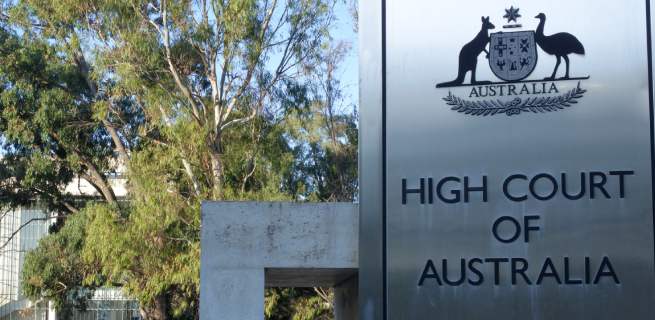By Paul Gregoire and Ugur Nedim
The High Court of Australia has, for the second time in 18 months, ruled in favour of a legal regime that permits indefinite detention.
However, unlike its June 2021 ruling, which found that the executive can detain illegal noncitizens without end, last Wednesday’s decision impacts inmates deemed high risk.
The case involved Noongar man Peter Garlett, now in his late 20s, challenging the decision of the West Australian state, which, in determining him a high risk offender, made the decision to continue his incarceration after his sentence expired last October.
This decision was made under the provisions of the McGowan government’s High Risk Offenders Act 2020 (WA) (HRO Act), which provides that certain offenders found to pose a continuing threat to the community can either be subjected to ongoing detention or extended supervision in the community.
In representing Garlett, Roe Shine Legal Services argued that the WA high risk offenders regime is unconstitutional and it breaches the Kable principle, which maintains that a state cannot impose a non-judicial function upon its courts.
But the majority of the High Court determined on 7 September that the imposition of HRO orders does not involve judges exercising non-judicial functions, and rather than these measures being punitive in nature, the orders are protective in terms of preventing harm to the community.
A trend in extending detention
Garlett was convicted of aggravated robbery, contrary to section 392 of the Criminal Code (WA), in 2019. He was then sentenced to three years and six months imprisonment. However, as the end of his sentence was nearing, WA authorities moved to extend his time inside.
The man, who’d been held on remand since his arrest in 2017, has since been released from prison following the lodging of his intention to appeal the original decision of the WA Supreme Court in issuing an interim continuing detention order, following a request from the State Solicitors Office.
Schedule 1 of the HRO Act sets out the list of serious offences in WA that can lead to a person being deemed a high risk offender, with section 7 of the legislation listing a set of factors that, coupled with the commission of a serious offence, can lead to an offender being subjected to a HRO order.
Section 26 of the HRO Act allows for a continuing detention order to be imposed on an offender, so they can be “detained in custody for an indefinite term”, while section 27 provides a supervision order, which involves extended monitoring in the community, with an end date being stipulated.
Controversial high risk offender regimes have been established around the country. In NSW, the Iemma government passed the Crimes (High Risk Offenders) Act 2006.
However, WA stand out nationwide in having designed its continuing detention order so that it allows for indefinite detention.
Siding with the state
In their joint ruling last week, High Court Chief Justice Susan Kiefel and Justices Patrick Keane and Simon Steward concluded that the WA Supreme Court, in imposing a continuing detention order, is not unduly punishing people or simply carrying out the will of the executive government.
Their Honours found that instead, the Supreme Court, in determining whether an offender is high risk and does require an extension of time spent in gaol, is exercising its judicial power in a manner that’s familiar to it.
“The court, in making a restriction order, is required to act upon its own evaluative judgment, by reference to prescribed criteria, in order to determine whether such an order is necessary for the purpose of protecting the community from harm,” they explained.
According to the three justices, the WA high risk offender scheme is actually “non-punitive”, as its objective is to protect the community from harm, as well as to attempt to determine future risk of harm in decisions about particular offenders.
In terms of whether the WA HRO regime should capture crimes such as robbery, the majority of the court found that the decision to include crimes such as this was a sound legislative decision, which aimed at envisaging the types of crimes that a high risk offender may be convicted of.
But Justice Michelle Gordon disagreed with her colleagues. She found that in performing the role of the decisionmaker regarding extending detention for serious offenders, the Supreme Court is attempting to prevent crimes, “one offender at a time”, which is a function of the executive.
Her Honour further warned that judicial extension of detention orders to prevent future reoffending are fast becoming the norm, and if this happens, the distinct role that the court plays in being the arbiter of rights disputes between citizens and the state will become blurred.
As for the other justices making up the full bench, Justice James Edelman agreed with the orders of Kiefel, Keane and Steward to make the majority, while Stephen Gageler agreed with the dissenting opinion of Gordon and Justice Jacqueline Gleeson determined the appeal should be dismissed.
Steeped in racism
The broader assertion those challenging the WA high risk offender regime were making was that ultimately, in a jurisdiction that operates like Western Australia, laws that do serve to encroach on the rights of inmates disproportionately effect First Nations people, like Garlett.
In March this year, 2,546 of the 6,310 adult inmates in the Western Australian corrections system, or 40 percent of them, were First Nations people. Yet, this is while Aboriginal and Torres Strait Islander peoples only make up around 3.1 percent of the overall population.
Curtin University Law School Associate Professor Dr Hannah McGlade was assisting with the case. She told Sydney Criminal Lawyers last September that as the HRO laws were potentially going to affect 1,100 inmates, she predicted that 500 First Nations adults would be captured amongst them.
In March this year, McGlade, a Noongar woman, added that “The Act is really punishing people for being Aboriginal, having a history of incarceration, poverties, systemic discrimination and then classifying them as ’repeat high risk serious offenders’.”
Indeed, it would seem that even though these sorts of discriminatory implications are linked to the WA high risk offender regime, they didn’t pose any real concern to the High Court when determining to uphold these laws.











